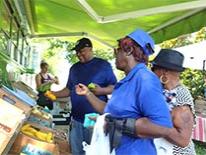
Federal Nutrition Assistance Programs
- Special Supplemental Nutrition Program for Women, Infants, and Children (WIC) – Provides nutrition education, breastfeeding support, healthy foods, and referrals to healthcare and other community services to pregnant women, new mothers, infants, and children. Dads, grandparents, foster parents of young children, and working families are welcome too. WIC participants also receive vouchers to spend on fresh fruits and vegetables at the farmers market during the summer months through the WIC Farmers' Market Nutrition Program (FMNP).
- Supplemental Nutrition Assistance Program Education (SNAP-Ed) teaches people eligible for SNAP about healthy nutrition, how to make food dollars stretch further, and how to be physically active at any age in line with the Dietary Guidelines for Americans and MyPlate.
- The Commodity Supplemental Food Program (CSFP) provides seniors with low-income a monthly box of nutritious groceries and nutrition education. CSFP participants also receive vouchers to spend on fresh fruits and vegetables at the farmers market during the summer months through the Senior Farmers' Market Nutrition Program.
- The WIC Farmers’ Market Nutrition Program and the Senior Farmers’ Market Nutrition Program aims to expand the awareness and use of farmers’ markets by providing fresh fruits and vegetables to women, infants (6-12 months), children and seniors.
- Nutrition Toolkits
View the Nutrition Toolkits below to learn more about what Federal Nutrition Programs you may be eligible for in the District.
Need help determining your eligibility? Use our Eligibility Estimator.
Local Nutrition Assistance Programs
- The Produce Plus Program provides DC residents with low-income up to $20 per week to purchase local produce at Farmers Markets across the city.
- Produce Prescription Program (PRx) formerly known as Fruit and Vegetable Prescription (FVRx), supports medical professionals in the District to prescribe fresh fruit and vegetables to patients experiencing diet-related chronic illnesses (diabetes, pre-diabetes, and hypertension) and food insecurity.
- The Healthy Corner Stores Partnership empowers small businesses in underserved neighborhoods to stock and sell nutritious, affordable foods, in turn making it easier for residents to purchase healthy, fresh options.
- Joyful Food Markets are monthly free markets at 53 elementary schools in Ward 7 and 8. Students receive 23 pounds of produce and healthy pantry items in a supportive, education-focused environment.
- Food and Friends provides medically-tailored meals to homebound DC residents and their caregivers. The service is available to patients with chronic diseases, including poorly managed diabetes upon recommendation of their health care provider.
- Mobile Markets bring fresh produce to all parts of the District with an emphasis on communities facing barriers to food access.
Service Contact:
Nutrition and Physical Fitness Bureau
Contact Phone:
(202) 442-9397
Contact Fax:
(202) 535-1710
Contact TTY:
711
Contact Suite #:
3rd Floor
Office Hours:
Monday to Friday 8 am to 5 pm
Service Location:
Health, Department of
GIS Address:
2201 Shannon Place SE
City:
Washington
State:
DC
Zip:
20020


